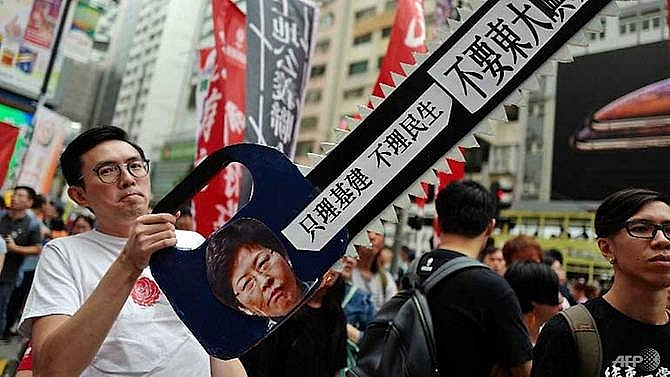Thousands protest proposed artificial islands for Hong Kong housing
 |
| A protester holds a sign with an image of Hong Kong Chief Executive Carrie Lam during an anti-reclamation demonstration in Hong Kong. (Elaine YU/AFP) |
The government's proposal to reclaim 1,700 hectares of land around Hong Kong's largest outlying island, Lantau, has been touted as a solution to the pressing housing shortage in the city - notorious for being one of the least affordable markets on the planet.
City leader Carrie Lam said new residential units on the proposed artificial islands could accommodate 1.1 million people in the coming years, and pledged to reserve 70 per cent of them for public housing.
But critics say the massive projects are too costly and will also destroy the environment - especially marine life - with many also expressing frustration over the lack of public say in the plans.
There is no official figure for how much the islands will cost, but some campaigners have put the figure at HK$800 billion (US$102 billion).
Protesters chanted "We don't want white elephants!" in Sunday's march, joined by children holding up their own illustrations of Lantau's famous Chinese white dolphins - whose numbers have plunged due to recent construction and reclamations, according to environmentalists.
"There are many ways to find land in Hong Kong, but (the authorities) don't want to cross the property developers," said 52-year-old Mr. Chan, referring to the government's reluctance to take back the vast land banks held by developers.
For some, the project should be rejected for its environmental impact alone.
"This shouldn't be controversial. Once you've destroyed the environment, that's it," said accountant Mrs. Wong.
Mr Chan and Mrs Wong only provided their surnames.
City officials are promoting the future metropolis of Lantau, which is linked to the mainland with a mega-bridge, as a gateway to the world and to neighbouring Chinese cities. Hong Kong's international airport - also partially built on reclaimed land - is located just off Lantau.
This is not the first time a mega infrastructure project has sparked outcry in the city.
Hong Kong's new high-speed rail link to the mainland and the soon-to-be-opened bridge connecting the city with Macau and Zhuhai have also proven divisive.
Supporters say the multi-billion-dollar projects will boost business, while others claim they are politically driven and costly white elephants aimed at blurring the boundaries between Hong Kong and mainland China as Beijing tightens its grip over the semi-autonomous city.
Prominent democracy activist Nathan Law, who joined Sunday's protest, said the government's use of public funds to "ardently" pursue mega-projects rather than welfare programmes such as universal pension shows its lack of will to improve people's livelihoods.
"This is how an undemocratic government who doesn't need to be accountable to the people performs," Law told AFP.
What the stars mean:
★ Poor ★ ★ Promising ★★★ Good ★★★★ Very good ★★★★★ Exceptional
 Tag:
Tag:
Related Contents
Latest News
More News
- Russian President congratulates Vietnamese Party leader during phone talks (January 25, 2026 | 09:58)
- Worldwide congratulations underscore confidence in Vietnam’s 14th Party Congress (January 23, 2026 | 09:02)
- Political parties, organisations, int’l friends send congratulations to 14th National Party Congress (January 22, 2026 | 09:33)
- 14th National Party Congress: Japanese media highlight Vietnam’s growth targets (January 21, 2026 | 09:46)
- 14th National Party Congress: Driving force for Vietnam to continue renewal, innovation, breakthroughs (January 21, 2026 | 09:42)
- Vietnam remains spiritual support for progressive forces: Colombian party leader (January 21, 2026 | 08:00)
- Int'l media provides large coverage of 14th National Party Congress's first working day (January 20, 2026 | 09:09)
- Vietnamese firms win top honours at ASEAN Digital Awards (January 16, 2026 | 16:45)
- ASEAN Digital Ministers' Meeting opens in Hanoi (January 15, 2026 | 15:33)
- ASEAN economies move up the global chip value chain (December 09, 2025 | 13:32)






















 Mobile Version
Mobile Version